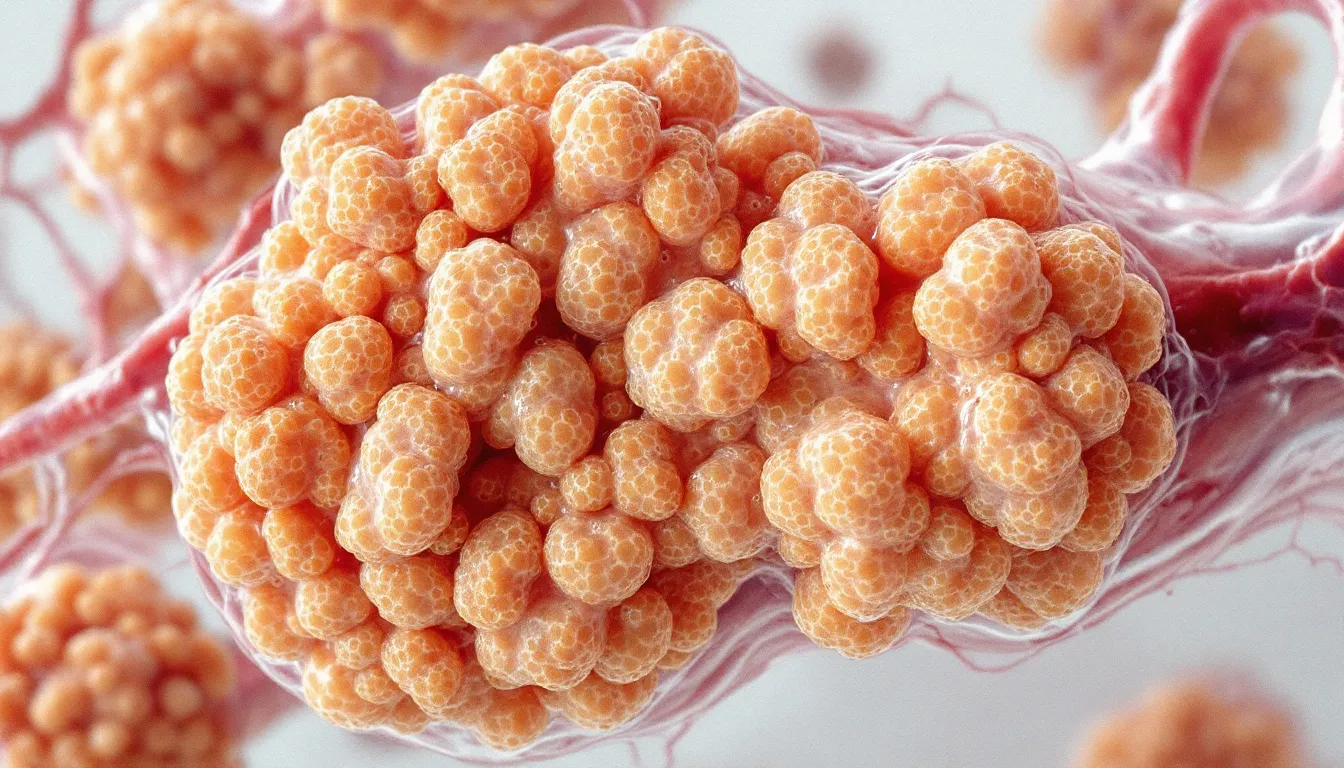Brown Fat Functions and Benefits for Metabolic Health
Introduction to Brown Fat Cells
Brown fat cells, also known as brown adipose tissue, play a crucial role in maintaining body temperature and burning calories by generating heat. Brown fat cells are one of several types of fat cells found in the human body, each with unique functions.
Unlike white fat cells, brown fat cells are highly metabolically active and help to generate heat, which burns calories.
The presence of brown fat cells has been linked to improved insulin sensitivity and reduced risk of obesity-related diseases.
Brown fat makes up a small percentage of total body fat; adults generally have less brown fat compared to white fat, and the percentage of brown fat can vary depending on body weight and age.
Research has shown that increasing brown fat activity can help to improve glucose metabolism and reduce the risk of type 2 diabetes.

Types of Fat and Adipose Tissue
- There are several types of fat, including white fat, brown fat, and beige fat, each with distinct functions and characteristics.
- White fat, also known as white adipose tissue, stores energy in the form of triglycerides within the body's fat cells, which play a significant role in overall health and can contribute to obesity.
- Brown fat, on the other hand, is highly metabolically active and helps to generate heat, making it a potential target for treating obesity. Lean individuals and infants tend to have more brown fat than others, which may influence metabolism and body composition.
- Beige fat is a type of fat that is formed through the browning process of white fat and has been shown to have similar metabolic benefits to brown fat.
- Understanding the different types of fat and their functions is essential for developing effective strategies for maintaining healthy fat levels.
Dietary Influences on Brown Adipose Tissue
Dietary factors, such as consuming healthy fats like polyunsaturated fats and monounsaturated fats, can help to support brown adipose tissue activity. Examples of healthy fats include corn oil and sesame seeds, which are good sources of essential omega-3 and omega-6 fatty acids.
Foods high in saturated fats and trans fats, on the other hand, can have negative effects on brown fat activity and overall metabolic health. Many foods, both animal and plant-based, contain different types of fats, so it is important to choose wisely for optimal health.
A diet rich in whole grains, fruits, and vegetables can help to support the growth and activity of brown fat cells. Plant foods, such as nuts and oils, are especially rich in healthy fats that support brown fat activity.
Certain nutrients, such as omega-3 fatty acids found in oily fish, have been shown to have beneficial effects on brown fat activity.
Avoiding processed foods and fried foods, which are high in unhealthy fats, can also help to support brown fat health.

Nutrition and Fat Metabolism
Nutrition plays a critical role in fat metabolism, with certain nutrients helping to support the activity of brown fat cells. Brown fat activity can also help regulate blood sugar by breaking down glucose for energy.
Amino acids, such as those found in protein-rich foods, can help to support the growth and activity of brown fat cells.
Healthy fats, such as those found in olive oil and sunflower oil, can also help to support brown fat activity. Fat helps the body absorb vitamins and provide energy, but the type of fat consumed can impact health.
Consuming a balanced diet that includes a variety of whole foods can help to support overall metabolic health and promote the growth and activity of brown fat cells. Cholesterol is a fatty substance found in the blood, and dietary fats can influence cholesterol levels. Saturated fats can raise low density lipoprotein (LDL) and lower high density lipoprotein (HDL), which may negatively affect blood vessels and cardiovascular health.
Understanding how different nutrients affect fat metabolism can help individuals make informed choices about their diet and lifestyle.
The Role of Good Fat in Metabolic Health
Good fats, such as unsaturated fats—including omega-3 and omega-6 fatty acids—provide important health benefits, such as reducing the risk of certain diseases, and play a crucial role in maintaining metabolic health.
These fats help to support the activity of brown fat cells and can improve insulin sensitivity and reduce the risk of obesity-related diseases. Including omega-3 and omega-6 fatty acids in your diet has additional health benefits, such as supporting heart health and lowering inflammation.
Consuming foods high in good fats, such as nuts and seeds, can help to support overall metabolic health.
Replacing saturated fats with unsaturated fats, such as those found in vegetable oils, can also help to improve metabolic health.
A diet rich in good fats can help to support the growth and activity of brown fat cells, leading to improved metabolic health.
Heat Production and Energy Expenditure
- Brown fat cells play a crucial role in heat production and energy expenditure, helping the body generate heat and burn more calories.
- The browning process of white fat can also help to increase heat production and energy expenditure.
- Exposure to cold temperatures, such as taking a cold shower, can help to activate brown fat cells and increase heat production.
- Exercise, particularly aerobic exercise, can also help to increase brown fat activity and improve metabolic health.
- Understanding how to activate brown fat cells and increase heat production can help individuals improve their metabolic health and reduce their risk of obesity-related diseases.

Foods High in Nutrients that Support Brown Fat
- Certain foods, such as those high in polyunsaturated fats and monounsaturated fats, can help to support brown fat activity.
- Fatty fish, such as salmon, are high in omega-3 fatty acids and can help to support brown fat health.
- Nuts and seeds, such as chia seeds and sunflower seeds, are high in healthy fats and can help to support brown fat activity.
- Whole grains, such as brown rice and quinoa, can also help to support brown fat health.
- Consuming a variety of whole foods can help to provide the nutrients needed to support brown fat activity and overall metabolic health.
When choosing foods, be sure to check nutrition labels for total fat content and consider reduced fat options to make healthier choices that support brown fat activity.
The Impact of Bad Fat on Metabolic Health
Bad fats, such as saturated fats and trans fats, are considered unhealthy fat and should be limited in a healthy diet.
Consuming high amounts of unhealthy fat can lead to insulin resistance and an increased risk of obesity-related diseases.
Foods high in unhealthy fat, such as processed and fried foods, can also contribute to weight gain and metabolic problems.
Reducing or avoiding unhealthy fat, such as those found in coconut oil and palm oil, can help to improve metabolic health.
Understanding the negative effects of unhealthy fat can help individuals make informed choices about their diet and lifestyle.
Strategies for Lower Fat Levels
- Reducing overall fat intake, particularly saturated fats and trans fats, can help to improve metabolic health.
- Replacing bad fats with good fats, such as unsaturated fats, can also help to improve metabolic health.
- Increasing physical activity, particularly aerobic exercise, can help to increase brown fat activity and improve metabolic health.
- Getting enough sleep and managing stress can also help to support brown fat health and overall metabolic health.
- Understanding the different strategies for reducing fat levels can help individuals develop a personalized plan for improving their metabolic health.
The Benefits of Low Fat Diets
- Low fat diets, particularly those that are high in good fats, can help to improve metabolic health.
- Reducing saturated fat intake can help to lower cholesterol levels and reduce the risk of heart disease.
- Consuming a diet low in bad fats and high in good fats can help to support brown fat activity and improve insulin sensitivity.
- A low fat diet can also help to reduce the risk of obesity-related diseases, such as type 2 diabetes.
- Understanding the benefits of low fat diets can help individuals make informed choices about their diet and lifestyle.

Maintaining Healthy Fat Levels
Maintaining healthy fat levels is essential for overall well-being, as it helps regulate body temperature, burn calories, and keep cholesterol levels in check. The balance between different types of fats in your diet plays a significant role in supporting metabolic health. Consuming too much saturated fat can raise cholesterol levels and increase the risk of heart disease, while replacing saturated fats with unsaturated fats—such as polyunsaturated fats and monounsaturated fats—can help lower cholesterol and support heart health.
Brown fat cells, or brown adipose tissue, are especially important for maintaining healthy fat levels. These specialized fat cells burn calories and generate heat, helping the body maintain body temperature and reducing the risk of obesity. Supporting the activity of brown fat cells through a healthy diet and lifestyle can make a meaningful difference in your metabolic health.
A healthy diet that includes a balance of saturated and unsaturated fats, along with essential fatty acids, is key to maintaining healthy fat levels. Incorporating healthy fats from sources like olive oil, rapeseed oil, and sunflower oil, while reducing intake of trans fats and saturated fats, can help support your body’s fat metabolism. Whole grains, fruits, vegetables, and lean proteins provide the nutrients your body needs to keep fat cells functioning optimally.
Regular exercise, including both cardio and strength training, is another important factor. Physical activity helps burn calories, build muscle cells, and improve insulin sensitivity, all of which contribute to healthy fat levels and a lower risk of chronic diseases.
In addition to diet and exercise, lifestyle habits such as getting enough sleep and managing stress are crucial. Chronic stress and lack of sleep can disrupt hormone levels, leading to increased fat storage, especially around the midsection. By prioritizing rest and stress management, you can help your body maintain a healthy balance of fat.
Finally, avoiding processed foods and fried foods that are high in unhealthy fats, and focusing on a variety of whole foods, will help you maintain healthy fat levels and support your overall health. Making these changes can help your body’s adipose tissue—including brown fat cells—work more efficiently to burn calories, regulate body temperature, and keep your metabolism running smoothly.

Conclusion and Call to Action
In conclusion, brown fat cells play a crucial role in maintaining metabolic health, and understanding how to support their activity can help individuals improve their overall health.
By consuming a balanced diet, avoiding bad fats, and increasing physical activity, individuals can help to support brown fat health and reduce their risk of obesity-related diseases.
Further research is needed to fully understand the benefits and functions of brown fat, but the current evidence suggests that it plays a critical role in maintaining metabolic health.
Individuals can take action to support their brown fat health by making informed choices about their diet and lifestyle.
By working together, we can promote a better understanding of the importance of brown fat and develop effective strategies for maintaining healthy fat levels.










